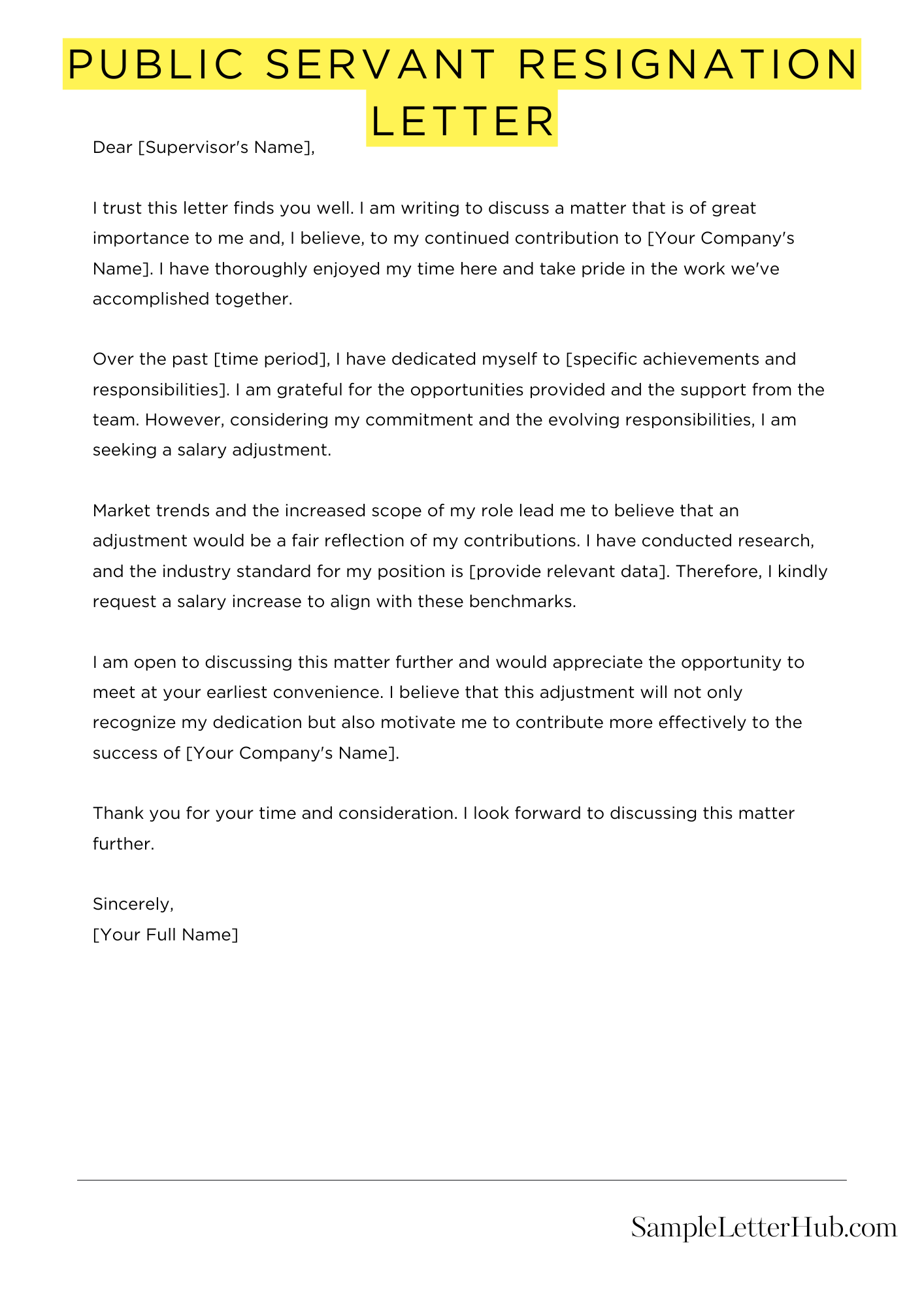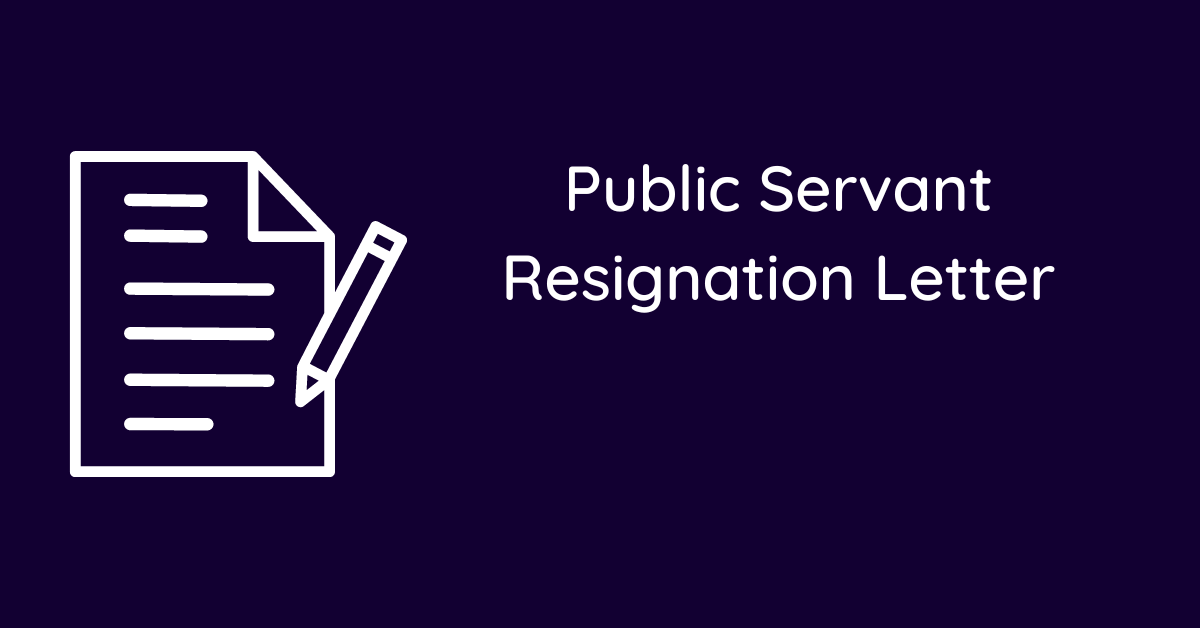A public servant resignation letter is a formal document that expresses your decision to leave your position in the public sector. Writing a clear and professional resignation letter is essential for leaving a job on good terms. In your letter, be polite and humble, and express your gratitude for the opportunity to serve.
When writing a public servant resignation letter, it’s important to be clear and concise. State your intention to resign, and provide your last date of employment. You can also include a brief statement expressing your appreciation for the opportunity to work in the public sector.
Below, we’ve included a template public servant resignation letter that you can use as a guide. Feel free to adapt it to fit your specific circumstances.
Public Servant Resignation Letter
Dear [Recipient Name],
Please accept this letter as formal notification that I will be resigning from my position as [Your Position] at [Organization Name], effective [Your Last Date of Employment].
During my time at [Organization Name], I have gained invaluable experience and knowledge that I will cherish. I am grateful for the opportunities and support I have received during my tenure.
I wish you and [Organization Name] all the best in the future.
Sincerely,
[Your Signature]
Short Public Servant Resignation Letter Sample
Please accept this letter as formal notification that I am resigning from my position as Public Servant at [Company Name]. My last day of employment will be [Your Last Day]. Thank you for the opportunity to grow and learn during my time here. I wish you and the company continued success. I am happy to assist in the transition process to ensure a smooth handover of my responsibilities.
I wish you all the best with your public servant resignation letter.
When it’s time to say farewell, expressing your gratitude and best wishes can make the transition smoother:

How to Write a Public Servant Resignation Letter
1. Start with a Formal Introduction
Begin your letter with a formal salutation, such as “Dear [Recipient Name].” Clearly state your intention to resign from your position as a public servant. Include the date your resignation will take effect.
2. Express Gratitude and Appreciation
Take this opportunity to express your gratitude for the opportunity to serve. Mention specific experiences or accomplishments that have been meaningful to you. This shows appreciation for the time you’ve spent in the role.
3. State Your Reasons for Resigning
While it’s not necessary to go into excessive detail, briefly state your reasons for resigning. Be honest and professional, focusing on positive aspects such as new opportunities or personal growth.
4. Offer Assistance in the Transition
Demonstrate your commitment to a smooth transition by offering to assist in any way possible. This could include training your replacement or providing documentation. Such gestures show your dedication to the organization.
5. Close with Well Wishes
End your letter with a polite and professional closing, such as “Sincerely” or “Respectfully.” Express your well wishes for the organization’s continued success. A positive and respectful tone leaves a lasting impression.
Public Servant Resignation Letter: 6 FAQs Answered
When it comes to resigning from your public service role, it’s crucial to do so professionally and respectfully. Here are six frequently asked questions and answers to guide you:
1. What should I include in my resignation letter?
Your resignation letter should include the following key elements:
- Your name and contact information
- The date
- The name of the person you are addressing (e.g., your supervisor)
- A clear statement of your resignation
- Your last date of employment
- An expression of gratitude for the opportunity to serve
- Any relevant details or reasons for your resignation (optional)
2. How should I format my resignation letter?
Use a professional font and font size (e.g., Times New Roman, 12pt). Keep the letter concise and to the point, typically around 3-5 paragraphs. Use formal language and avoid slang or abbreviations.
3. When should I submit my resignation letter?
It’s generally advisable to give at least two weeks’ notice, or more if possible. This allows your employer time to prepare for your departure and find a suitable replacement.
4. Do I need to provide a reason for my resignation?
While it’s not mandatory, it’s often considered polite to provide a brief explanation for your resignation. This could include pursuing a new opportunity, returning to school, or personal reasons.
5. What should I do if I’m feeling nervous about resigning?
It’s natural to feel some anxiety when resigning. Remember to approach the conversation with confidence and professionalism. Be prepared to answer any questions your supervisor may have and express your appreciation for the opportunity to serve.
6. Can I withdraw my resignation letter?
In most cases, yes. However, it’s important to communicate your decision to withdraw your resignation as soon as possible. Be aware that your employer may not always accept your request.
Before making the decision to resign from your job, it’s essential to consider the legal aspects:
Understanding your emotions after quitting your job is important. Explore why you might be feeling sad:
Related
- Resignation letter sample
- Forced resignation letter
- Resignation letter due to going abroad
- Resignation letter due to marriage
- Resignation letter due to other opportunity
- Resignation letter due to mistake

